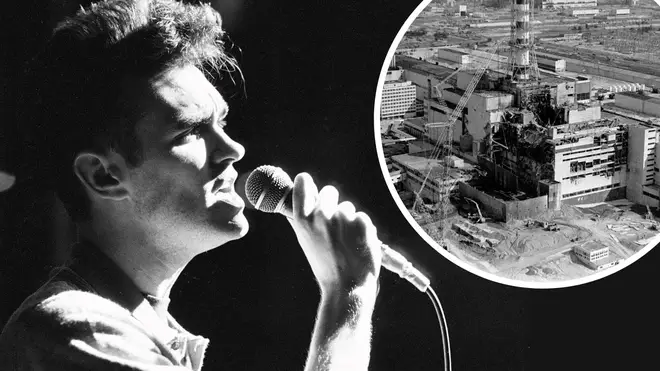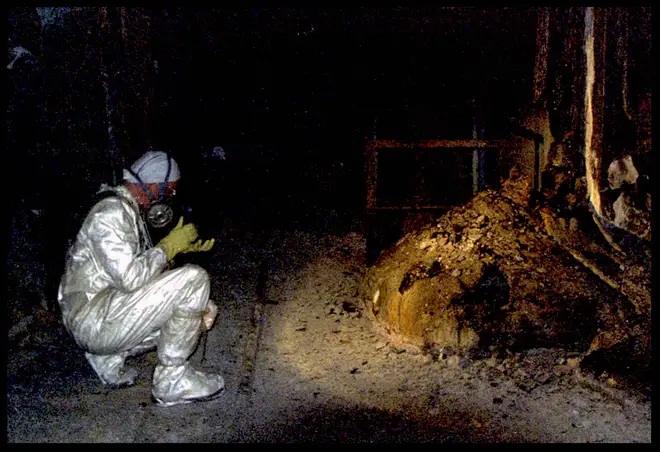On Air Now
The Radio X Indie Night with Rich Wolfenden 7pm - 11pm
21 July 2024, 15:00

The nuclear power station’s accident in 1986 has been the subject of an acclaimed TV drama… but the real events prompted Morrissey and Johnny Marr to write one of their most famous songs.
One of the most talked about TV series of 2019 was HBO/Sky’s Chernobyl, about the nuclear disaster that befell the Soviet power station in April 1986. The hard-hitting mini-series, written by Craig Mazin, and directed by Johan Renck, prompted a lot of conversation about the incident - but did you know it inspired one of The Smiths’ most enduring hits?

Chernobyl 2019 trailer
One of the most rabble-rousing of The Smiths' songs, Panic was one of the Manchester band’s biggest hits, making Number 11 in the UK charts in the summer of 1986. The song - a stomping, guitar led tune that owes a lot to Metal Guru by Marc Bolan - talks of civil unrest around the country and bemoans the fact that “the disco” and “the DJ” play music that “says nothing to me about my life”.

The Smiths - Panic (Official Music Video)
The music press at the time took this to mean that The Smiths - and Morrissey in particular - were attacking hip hop culture and black music in general. Paolo Hewitt in the NME wrote: “When he starts using words like disco and DJ, with all the attendant imagery that brings up for what is a predominantly white audience, he is being imprecise and offensive." Even as recently as 2012, Buzzfeed called the song a “condemnation of dance music”.
Morrissey may have courted controversy before and after this furore, but the genesis of Panic was down to an exasperation at 1980s pop culture in general.

An angry Johnny Marr put the record straight in the NME in February. He explained that the song was inspired by the news reports about Chernobyl, and the terrible accident at a nuclear power plant in the then-Soviet Union.
In the early hours of 26 April 1986, a safety test at the nuclear facility went catastrophically wrong, causing the core to explode and radioactive material was released into the air. An inxperienced team and inadequate designs at the plant were later found to be the cause - the quest to find whose fault it was is a key part of the Chernobyl TV series.

Hundreds of people were affected by the accident, including deaths from acute radiation sickness and the effects were felt as far away as the UK, where radioactive traces were found in parts of Northern Ireland, Wales, Northern England and Scotland. It remains, with the Fukushima accident in 2011, the worst nuclear disaster in history.

Marr recalled that he and Morrissey were listening to Radio 1’s Newsbeat programme giving the latest updates on the disaster - and at the time, people in the UK were worried about clouds of radioactive material heading their way.
He remembered: “The story about this shocking disaster comes to an end and then, immediately, we're off into Wham!'s I'm Your Man. I remember actually saying 'what the fuck has this got to do with peoples' lives?'
“We hear about Chernobyl, then, seconds later, we're expected to be jumping around to I'm Your Man... And so: 'Hang the blessed DJ'."

Wham! - I'm Your Man (Official Video)
Marr went on: “I think it was a great lyric, important and applicable to anyone who lives in England. I mean, even the most ardent disco fan wouldn't want to be subjected to that stuff, would they?"
Morrissey and Marr were sufficiently outraged to put pen to paper and call out the inanity of daytime radio and pop music in general in the UK.
It must have been odd to hear Panic on the radio then - among the songs that Morrissey and Marr were criticised. Thankfully, despite hitting the Top 20 following its release on 21 July 1986, The Smiths didn’t perform Panic on Top Of The Pops, sparing them no end of embarrassment.
Panic went on to become a live favourite, thanks to the addition of second Smiths guitarist Craig Gannon, and Morrissey rammed the point home by cavorting around the stage with a noose to emphasise the chorus of "Hang the DJ, hang the DJ..."

Johnny Marr on How Soon Is Now by The Smiths